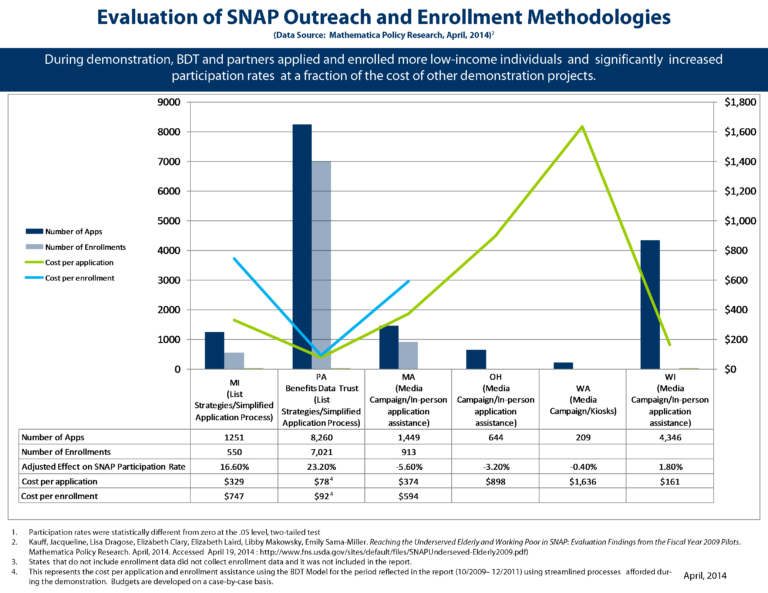
In 2010, the United States Department of Agriculture (USDA) funded pilot projects in three states (Pennsylvania, New Mexico, and Washington) to explore the issue of low SNAP participation among seniors. The overall aim of the projects was to utilize existing data for individuals seeking medical assistance – available to states through the Medicare Improvements for Patients and Providers Act (MIPPA) – to identify seniors who were likely eligible for SNAP and invite them to apply. Through a competitive process, Benefits Data Trust was selected to conduct a pilot in Pennsylvania.
An evaluation of the pilots, conducted by Mathematica Policy Research on behalf of the USDA, demonstrates that Benefits Data Trust successfully increased SNAP participation among low-income seniors in Pennsylvania.
The project took a data-driven approach, targeting older adults who had already applied for the Low-Income Subsidy for Medicare Part D (also known as Extra Help), but were not yet enrolled in SNAP benefits. By increasing vulnerable seniors’ access to SNAP, this project reduced hunger and improved economic stability.
Over the course of 35.5 months (October 1, 2010 – September 12, 2013), BDT’s pilot achieved the following results:
- Increased SNAP applications and enrollments for seniors in the target population. This project achieved an 11 percent increase in applications submitted on behalf of older adults, and a 7 percent increase in approved applications filed within 90 days.
- Operational costs of just $33 per senior on the list, significantly less than the other pilot projects. This is likely due to economies of scale, as BDT’s pilot had the largest target population list overall and was therefore able to spread costs more widely.
- No strain on County Assistance Offices, despite generating more SNAP applications. BDT’s pilot was cost neutral with regard to processing, and had no more SNAP case errors than usual. Half of all CAOs in the pilot also reported that processing the pilot cases was faster than or the same as processing regular SNAP applications.
- High levels of client satisfaction with BDT’s services. Among clients BDT contacted about SNAP, nearly all were satisfied with the information they received. 70 percent of seniors who applied for SNAP through the pilot reported they made the decision to apply because they were contacted by BDT, demonstrating the importance of proactive outreach to increase senior SNAP enrollment.
Read the full report.
